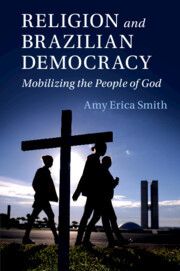Description
Religion and Brazilian Democracy
Mobilizing the People of God
Cambridge Studies in Social Theory, Religion and Politics Series
Author: Smith Amy Erica
Evangelical and Catholic groups are transforming Brazilian politics. This book asks why, and what the consequences are for democracy.
Language: English
Subject for Religion and Brazilian Democracy:
Approximative price 30.28 €
In Print (Delivery period: 14 days).
Add to cart
Religion and Brazilian Democracy
Publication date: 04-2022
Support: Print on demand
Publication date: 04-2022
Support: Print on demand
Approximative price 107.80 €
In Print (Delivery period: 14 days).
Add to cart
Religion and Brazilian Democracy
Publication date: 03-2019
222 p. · 15.7x23.5 cm · Hardback
Publication date: 03-2019
222 p. · 15.7x23.5 cm · Hardback
Description
/li>Contents
/li>Biography
/li>
As Brazilian democracy faces a crisis of legitimacy, political divisions grow among Catholic, evangelical, and non-religious citizens. What has caused religious polarization in Brazilian politics? Does religious politics shore up or undermine democracy? Religion and Brazilian Democracy: Mobilizing the People of God uses engaging anecdotes and draws on a wealth of data from surveys and survey experiments with clergy, citizens, and legislators, to explain the causes and consequences of Brazil's 'culture wars'. Though political parties create culture war conflict in established democracies, in Brazil's weak party system religious leaders instead drive divisions. Clergy leverage legislative and electoral politics strategically to promote their own theological goals and to help their religious groups compete. In the process, they often lead politicians and congregants. Ultimately, religious politics pushes Brazilian politics rightward and further fragments parties. Yet Religion and Brazilian Democracy also demonstrates that clergy-led politics stabilizes Brazilian democracy and enhances representation.
Part I. Introduction: 1. Introduction; 2. Clergy, congregants, and religious politicians; 3. Methods and case studies; Part II. What Clergy Think, Say, and Do: 4. What clergy think and say: religious teachings and political views; 5. What clergy do: encouraging partisan and electoral politics; Part III. How Congregants Respond: 6. Church influence on citizens' policy views and partisanship; 7. Church influence on voting behavior; 8. Church influence on citizen support for democracy; Part IV. Representation: 9. The representational triangle; 10. Conclusion: mobilizing the people of God.
Amy Erica Smith is associate professor of political science at Iowa State University. Smith's research has attracted funding from the National Science Foundation, Fulbright, Mellon, and Templeton, and the Award for Early Achievement in Research at Iowa State University. Her work on democracy in developing countries has appeared in top political science journals and in the Portuguese-language book, Legitimidade e qualidade da democracia no Brasil: Uma visão da cidadania (2011; with Lucio Rennó, Matthew Layton, and Frederico Batista Pereira).
© 2024 LAVOISIER S.A.S.




